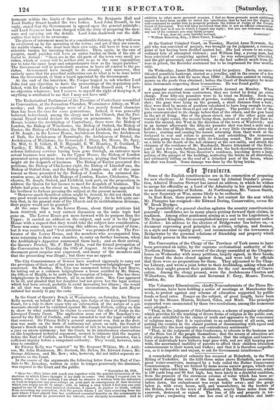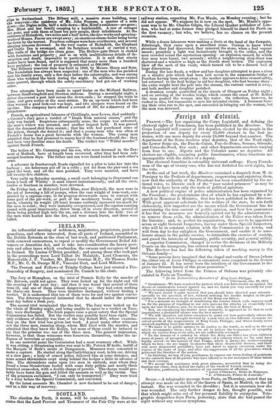'fit Vrnniurto.
Some of the English constituencies are in the commotion of preparing for new elections. At Greenwich, vacant by Admiral Dundas's promo- tion, Admiral Houston Stewart has issued an address, in which he wishes to merge his officiality as a Lord of the Admiralty in his personal claims as an honest supporter of Reform. At Northampton, Mr. Vernon Smith, the new Secretary at War, seems likely to be reelected.
In East Kent, there promises to be a hot contest for the seat which Mr. Plumptre has resigned—Sir Edward Dering, Conservative, yenta Sir W. Brook Brydges. The possibility of a general election agitates the country constituencies' generally : candidates are in many places putting forward their claims, in readiness. Among other gentlemen aiming at a seat in the Legislature, is. Mr. Sergeant Kinglake, the accomplished lawyer and very eminent author of Eothen : his address to the electors of Bridgewater lies before us,—a document expressing good principles in politics, religion, and finance, in a style and tone equally good; and recommended to the townsmen of Bridgewater by the personal relations of friendship and property which his family possess in the county.
The Convocation of the Clergy of the Province of York seems to have been prevented ab initio, by the supreme ecclesiastical authority of the Northern Primate. When several of the clergy assembled at the Chapter- house on Wednesday with many petitions, largely signed, in their hands, they found the doors closed against them, and were told by officials that there were no preparations for them. They adjourned to the Chap- ter Library, and wrote a joint letter to their Archbishop, asking when and where they might present their petitions for the real meeting of Convo- cation. Among the clergy present, were the Archdeacons Churton and Wilberforce, the Honourable and Reverend F. Grey, Messrs. Trevor', Gamlen, &c.
The Voluntary Educationists, chiefly Nonconformists of the Three De- nominations, have been holding a series of meetings at Manchester this' week, to protest against any scheme of education supported by public- funds or local rates. Essays on the subject, of great length, have been read by the Messrs. Hinton, Richard, Giles, and MialL The principles supported were enumerated by these two resolutions, among the numerous ones adopted— "That, in the judgment of this Conference, a scheme of popular education. which provides for the teaching of divers forms of religion at the public cost, is at once unfaithful to the claims of truth and oppressive to the conscience of religious men; that it is equivalent to an endowment of all sects, and putting the country in the absurd position of disseminating with equal zeal and liberality the most opposite and contradictory sentiments."
"That, in the judgment of this Conference, to educate is the business not of the State but of the people themselves ; that the means of education are fully adequate to the disposition to educate ; that the religion and benevo- lence of individuals have hitherto kept pace with, and are still keeping pace with, the ascertained inability of parents to afford their children education commensurate to their wants and wishes; and that it is therefore surperflu- ous, as it is impolitic and unjust, to ask for Government interference.
A remarkable physical calamity has occurred at Holmfirth, in the West Riding of Yorkshire. In the hills three miles above Holmfirth, are several great water-reservoirs, managed by a body called the Holme Conservancy Commissioners. They are formed by dams across narrow gorges, which con- vert the vallies into lakes. The embankment of the Bilberry reservoir, which is 150 yards long and 90 feet high, has been lately in a doubtful condition, from the pressure of the enormous column of water which has been ac- cumulated during the rains of the last mouth. On Thursday morning, before dawn, the embankment was swept bodily away ; and the gorge below it, with every house, mill, and manufactory, on the borders of the Holme, down to the town of Holmfirth, nearly three miles from the reservoir, destroyed or ruined. The loss of life and property is ter- ribly great ; surpassing what one has read of by avalanches and land- The bodies of Mr. Cumming and his son, who were drowned in the Der- -went at Matlock, have at length been recovered, after they had been sub- merged fourteen days. The father and son were found locked in each other's arms.
A schooner in Scarborough Roads signalled for a pilot to take her into the harbour ; six fishermen put off in a coble ; not far from the pier-end a sea :upset the boat, and all the men perished. They were married, and have left twenty-five children.
Very early on Saturday morning, a small craft belonging to Gravesend ran down a bark off Whitby : it sank almost instantaneously, and all the crew, twelve or fourteen in number, were drowned.
On Friday last, at Holywell Level Mine, near Holywell, the men were in the act of lowering a lift of pumps, when the vast weight of iron-work, sus- pended by a capstan-rope, in its progress downwards came in contact with. some part of the pit-work, or part of the machinery broke, and giving a
lurch, whereby increased . its weight (20 tons) became suddenly too much for the men to resist; they were instantly overpowered, and the capstan running round with great impetuosity, threw them off in every direction, several of them being pitched high into the air, and a distance into the field : two of the men were hurled into the fire, and were much burnt, and three were :killed.
slips in Switzerland. The Bilbery mill, a massive stone building, near the reservoir—the residence of Mr. John Furness, a quarter of a mile down—the Diglee mills, half a mile down—Mrs. Hirst's residence—are gone ; Mrs, Hirst and her family escaping by a hairbreadth. A row of cottages are gone, and with them at least ten poor people, their inhabitants. At the entrance of Holmfirth, two miles and a half down, the dye-works and spinning- worksof Messrs. Farrar are swept away; an enormous steam-boiler being borne far down by the torrent. Fourteen cottages were here overthrown, and several sleeping inmates drowned. In the very centre of Holmfirth, the Elephant and Castle Inn is swamped, and its furniture wrecked or carried a way. The walls of the bridge are clean gone. The Hollow-gate Street is choked with furniture and property ; and so on with multitudinous details of de- struction and death, impossible to particularize. It is said that ninety bodies have been found, and it is supposed that many more than a hundred have perished ; the loss of property is estimated at 600,000/. The Bilberry reservoir dam was built in 1840, by Messrs. Sharp and Sons. The foundation has always been suspected : one of the men who has perished sent his family away, only a few days before the catastrophe, and was among those who watched the bank during the night. In addition, there existed some quarrel, through which the safety-machinery had got out of working order.
Two attempts have been made to upset trains on the Midland Railway, between Southwingfield and Stratton stations. During a moonlight night, a driver discovered a post laid across the down-rails ; he stopped the train in time, and gave notice at the next station. By an up-train which had been thus warned a good look-out was kept, and two sleepers were found on the up-line. The company have offered a reward of 501. for a discovery of the perpetrator. French, an agricultural labourer of Chiddingly, near Lewes, died suddenly : a Coroner's Jury gave a verdict of "Death from natural causes," and the body was buried. Suspicions subsequently arose, the corpse was exhumed, the man's widow was arrested, and another inquest held. It was proved that the deceased died from arsenic ; that his wife had purchased some of the poison, though she denied it; and that a young man who was often at French's house was a great favourite with the woman. The young man admitted that he had promised to marry her if the husband should die : they had been very familiar since his death. The verdict was "Wilful murder they had Sarah French.



























 Previous page
Previous page